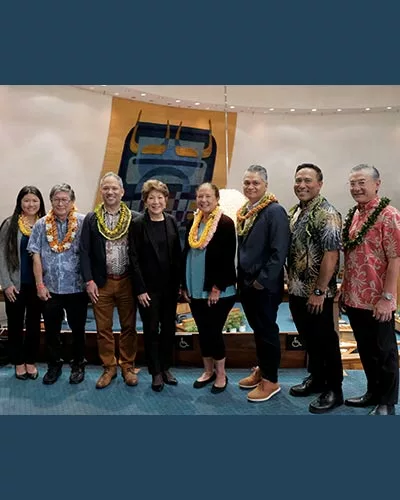On March 31, 2023, both chambers of the Hawaiʻi State Legislature paid homage to the groundbreaking efforts of the University of Hawaiʻi at Mānoa’s Ethnic Studies Department (ES) and one of the program’s early directors, Franklin Odo, and his colleagues.
The House of Representatives issued a resolution recognizing the department and its leadership – past and present – for its achievements in bringing the state to the forefront of academic and cultural conversations surrounding the issues of social justice and race relations. Acknowledged for their tremendous impact on the department were Franklin Odo; current ES faculty Roderick N. Labrador, Davianna Pōmaika‘i McGregor, Ethan Caldwell, Monisha Das Gupta, Ulla Hasager, Richard C. Rath and Ty P. Kāwika Tengen; and emeritus faculty Ibrahim G. Aoude, Noel Kent and Jonathan Y. Okamura.
Located in the College of Social Sciences, ES emerged as a response to the tumultuous civil rights, anti-war, ethnic empowerment and students’ rights sentiments of the 1960s. In the resolution, the House acknowledged ES’ storied past, as well as the leadership role it plays today in learning, research and community service connected to Hawaiʻi’s multiethnic population.
The state Senate honored the life and legacy of Odo, who passed away at the end of 2022. At the ceremony attended by members of Odo’s family, friends and colleagues, the Senate expressed its appreciation for his commitment to social justice throughout a career that spanned more than 50 years.
A nationally recognized scholar and professor of Asian American history, Odo was instrumental in elevating the ES program to department-level status at UH Mānoa. He also organized numerous exhibits, studies and projects featuring the histories and experiences of Asian and Pacific Islander immigration, acculturation and experiences in the U.S., and led a delegation of panelists to testify before the Commission on Wartime Relocation and Internment of Civilians (CWRIC).
The CWRIC was established to review the facts and circumstances surrounding the forced relocation and internment of Japanese during World War II, and the impact it had on American citizens and permanent resident aliens. Odo’s efforts led to the consideration and documentation of the wartime experiences of Japanese Americans interned in Hawaiʻi as part of the Civil Liberties Act of 1988. The act provided for $1.8 billion in appropriations and a presidential apology for the unlawful internment of Japanese Americans on the West Coast and in Hawaiʻi.
The Senate noted that Odo’s greatest legacy, however, will forever be embodied in his students. He was a teacher, mentor and friend to thousands of college students who were awakened and inspired by his experiential and activist teaching style. He not only challenged their way of thinking in evaluating events and how those events were relevant to current day events, but also instilled the need to create their own history in their own way.
A quote by Odo, taken from a 1990 interview conducted by Ethnic Studies’ Center for Oral History, perhaps best distills the impact of Odo, his colleagues and the Ethnic Studies Department on the world: “If you don’t control your own culture and your own vision of life, and your own participation in life, then you don’t control anything. And that’s what we’re about. The true spirit of any kind of democracy is to have people be autonomous at the same time that they know they are dependent on the community around them.”
